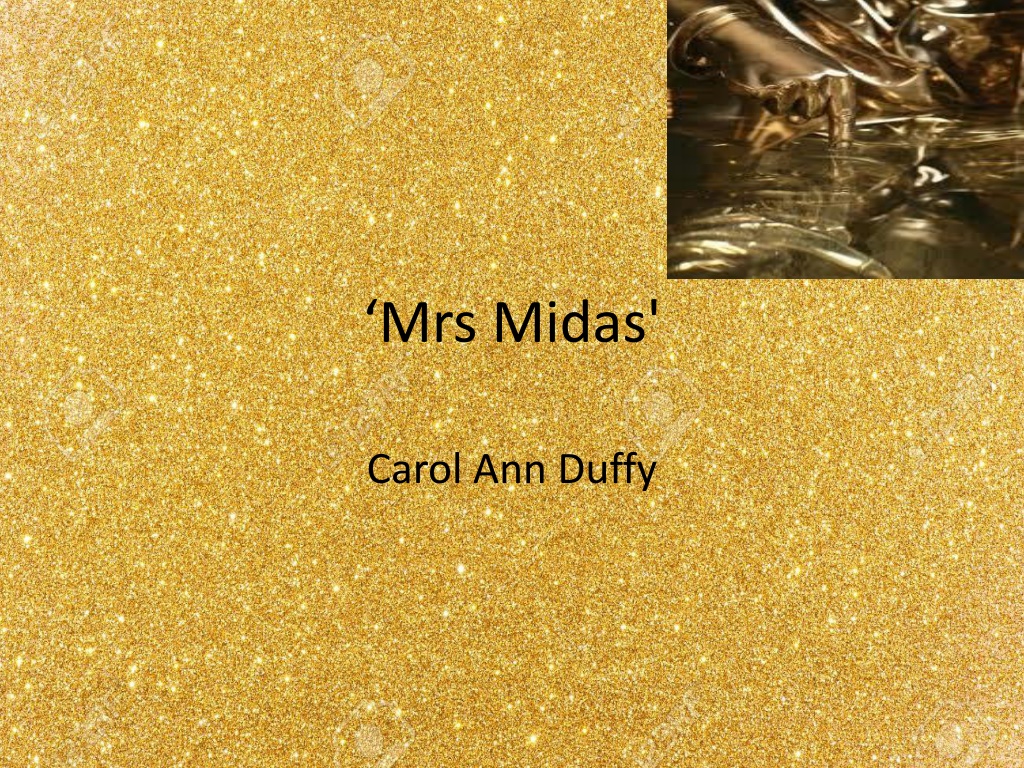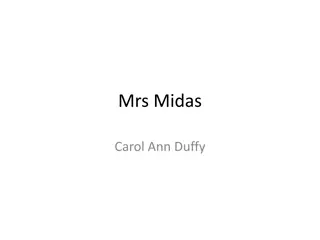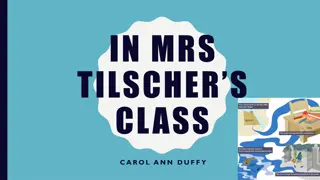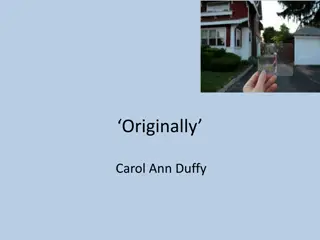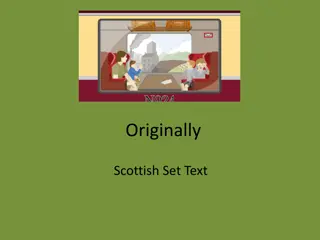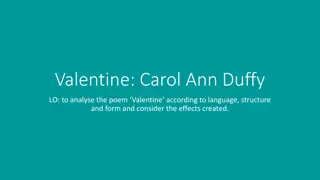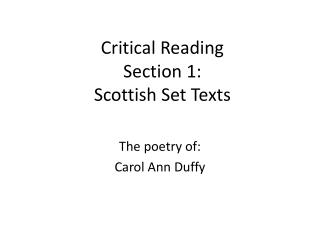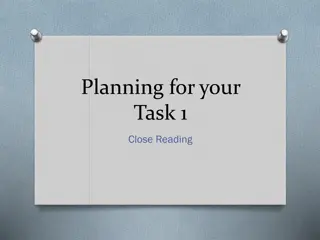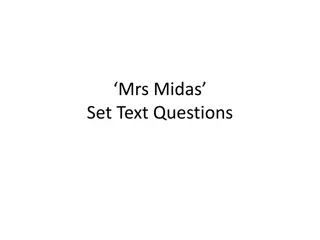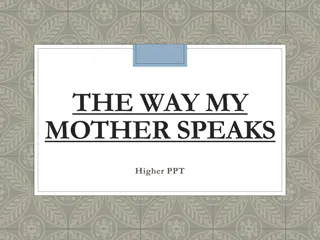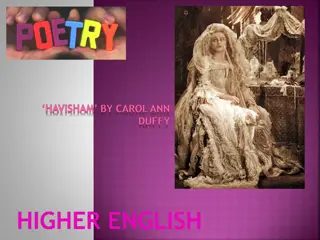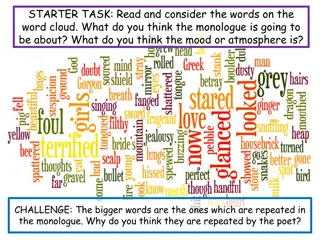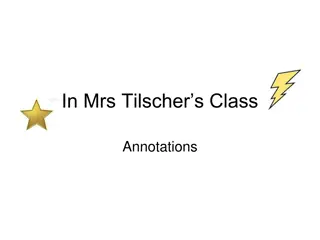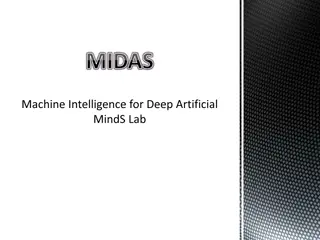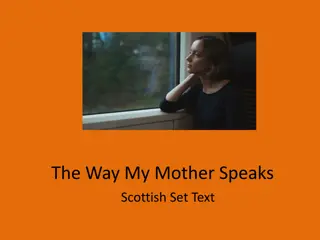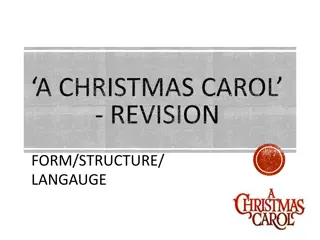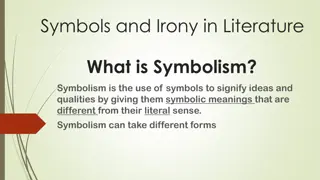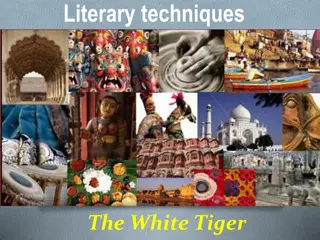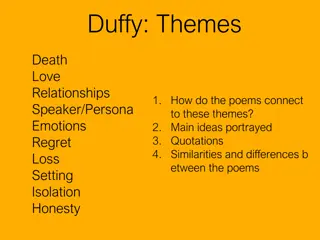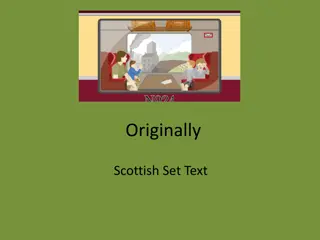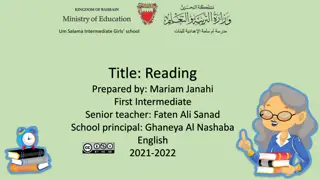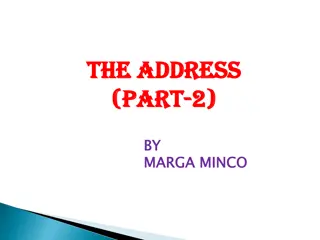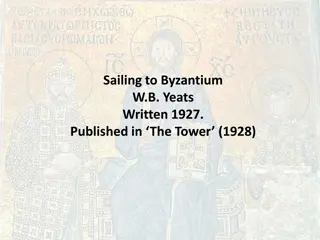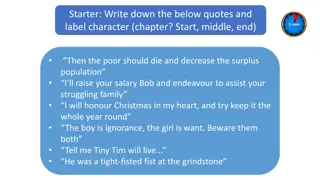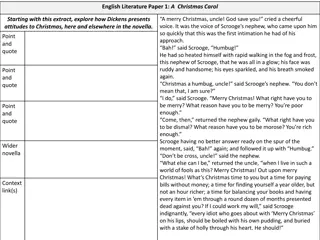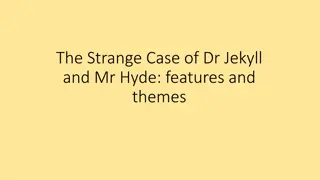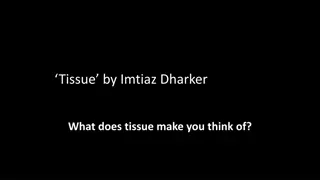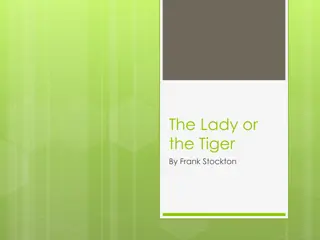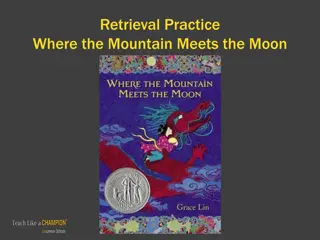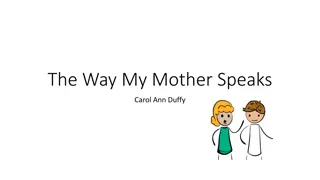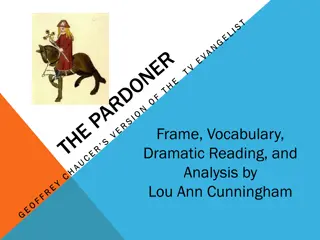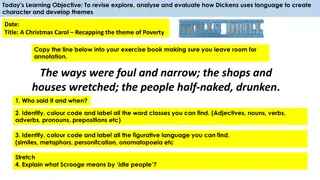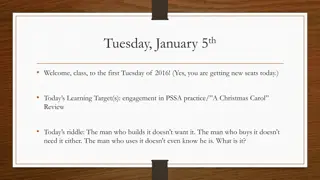Analysis of 'Mrs. Midas' by Carol Ann Duffy: Form, Structure, and Symbolism
In Carol Ann Duffy's poem "Mrs. Midas," a modern take on the myth of King Midas, the speaker, Mrs. Midas, reflects on her life with a husband whose touch turns everything to gold. The poem is a dramatic monologue, delving into themes of isolation, desire, and the consequences of unchecked power. Through symbolic imagery and clever wordplay, Duffy offers a thought-provoking and comical exploration of relationships and the nature of human desires.
Download Presentation

Please find below an Image/Link to download the presentation.
The content on the website is provided AS IS for your information and personal use only. It may not be sold, licensed, or shared on other websites without obtaining consent from the author. Download presentation by click this link. If you encounter any issues during the download, it is possible that the publisher has removed the file from their server.
E N D
Presentation Transcript
Mrs Midas' Carol Ann Duffy
Mrs Midas From Ovid sMetamorphoses, King Midas, a benevolent but foolish leader did a good deed for Dionysus who granted him a wish. He asked that whatever he touched, would be turned to gold. Unfortunately, this meant he could not eat, drink or hold his loved ones. Duffy takes the old myth and gives it a modern twist, seeing from the perspective of a modern housewife in this humorous and satirical monologue. https://www.youtube.com/watch?v=sxItH0I 6xmQ
Form and structure This poem is written in the form of a dramatic monologue from a female perspective, similar to the other poems in TheWorld sWife collection. Duffy presents an imaginary response from King Midas wife, providing a thought-provoking and comical insight into their lives. Features: Eleven stanzas of irregular line length Used to reflect how unpredictable and chaotic life has become for the couple as at any second, with a simple touch, Mrs Midas could be turned to gold.
Stanza 1 What is the symbolic significance of the time of year, given what happens in the relationship? Explain the effectiveness of the personification of the kitchen in the opening lines. How does it help to establish atmosphere and a sense of the character of Mrs Midas? How is Mr Midas first presented and how does his picture contrast with that of Mrs Midas? Stanza 2 Why is the metaphor the way the dark of the ground seems to drink the light of the sky appropriate in the context of this stanza or the poem in general? Discuss the effectiveness of the last two lines and explain how they add to the tone.
It was late September. Id just poured a glass of wine, begun to unwind, while the vegetables cooked. The kitchen filled with the smell of itself, its steamy breath gently blanching the windows. So I opened one, then with my fingers wiped the other s glass like a brow. He was standing under the pear tree snapping a twig. lateSeptember symbolic of a season/time of live coming to an end. Symbolises change/closure in their relationship. Already he is outside and she is inside so they are separate/distant from one another. there is perhaps a sense of self-containment in filled with the smell of itself and the implication that her conception of her own life is as isolating as his. She does not see: steam blanching the windows = symbolic of her blindness as to his desires and perhaps her own. destruction etc.) Irony/play on words alone under pair/pear tree? Extended personification of the kitchen adds a sense of intimacy as she wipes the window like a brow but Onomatopoeia of snapping - Contrast of his violent action and accompanying harsh p, t, and g sounds with short vowels, symbolises the disruption to come. Also symbolises his power/strength effortlessly/thoughtlessly that which he touches, can be destroyed. Foreshadows what it is to come (her fear of wine, begun/ unwind, while assonance and soft alliteration as well as enjambment contribute to the calm contented feel of the opening. Word choice of relaxed steamybreath and gently add to the peace of the scene. and how
Now the garden was long and the visibility poor, the way the dark of the ground seems to drink the light of the sky, but that twig in his hand was gold. And then he plucked a pear from a branch we grew Fondante d Automne and it sat in his palm like a light bulb. On. I thought to myself, is he putting fairy lights in the tree? Comic juxtaposition of sophisticated French name (romantic Comic effect arises from irony of her obliviousness to what is going on. Her incredulity is evident when she questions whether he is just putting fairy lights in the tree? Perhaps conveys reluctance to accept truth/reality? Also, the extension of her Contrast of poor visibility/revelation. Twig he snapped in stanza 1 now appears to be pure disbelief/confusion at what she is seeing brightness emanating from it. The full stops add a comedic Translation: the melting of Autumn : significant in relation to golden colour, metal melting and Autumn as signalling to an end. Again foreshadows how this wish will ruin their relationship. Specialty pear also indicates their pretentiousness. might suggest how she is also trapped in her own conception of Simile like a light bulb = shape of the pear and the natural connotations) with mundane simile of lightbulb . plucked word choice foreshadows/symbolises his lack of care in consequences/his arrogance/how quickly he can stop life etc. Also again shows his power/strength like snapping of twig conveyed too in stanza 1. imagery of the light bulb to associative connection with fairy lights dark of the ground seems to drink the light personification: ground (the source of gold), taking away the light (being able to see clearly or understand). Also effect, highlighting Mrs Midas shock, disbelief and sudden dawning of awareness of what she has just witnessed. This whimsical, light and humorous imagery is continued and contrasts with the seriousness of what has just happened. the world, as he is later on in the poem. gold. Highlights her Too far away to see what it is happening so at this point she assumes due to the steamed up windows and the fact that he is at the bottom of the garden, that she is seeing things. symbolises/foreshadows all light/happiness/vitality in their relationship will be eroded through the wish he has made (will no longer be able to touch one another etc.) Minor sentence On adds to the humorous effect by its simplicity; conveys her disbelief/surprise etc.
Stanza 3 How does Duffy achieve a sense of talking to her reader? What is her opinion of her husband? Explain fully how Duffy conveys this. Why would her husband laugh when she asks, What in the name of God is going on? Stanza 4 How do Mr and Mrs Midas reflect stereo-typical roles in this stanza? Explain the two possible meanings behind spitting out the teeth of the rich . What is the purpose and effect of the repetition/alliteration: as he picked up the glass, goblet, golden chalice, drank?
He came into the house. The doorknobs gleamed. He drew the blinds. You know the mind; I thought of the Field of the Cloth of Gold and of Miss Macready. He sat in that chair like a king on a burnished throne. The look on his face was strange, wild, vain. I said, What in the name of God is going on? He started to laugh. Humour continues from understatement achieved by short simple unelaborated sentences and chatty acknowledgement of the reader (use of second person) in contrast to the miraculous happenings. Conversational/informal tone: He sat in that chair and I said Almost like she needs someone to talk to about her thoughts/feelings so shares them with the reader. golden cloth. She describes Midas journey through the house as he turns the doorknobs and blinds into gleaming gold making his wife think back to a school history lesson about the Field of the Cloth of Gold. This was the site of the meeting, near Calais in France, between the kings of England and France in 1520. Both monarchs built lavish temporary palaces, embellished with His arrogant/haughty nature = conveyed through his posture in chair and laugh at the end of the stanza which is almost belittling/mocking her and her confusion (shown through question and invoking God to show her complete lack of comprehension.) above all others (exemplified in the laugh too.) Mrs Midas goes on to describe the strange, wild, vain face of her husband as he realises that he has been given a tremendous power which he believes in an egocentric manner has elevated him The sentences all have he as the subject and then the verb to show he is fully in control/the dominant one which equates to him choosing to make the wish without her knowledge/input.
I served up the meal. For starters, corn on the cob. Within seconds he was spitting out the teeth of the rich. He toyed with his spoon, then mine, then with the knives, the forks. He asked where was the wine. I poured with a shaking hand, A fragrant, bone-dry white from Italy, then watched as he picked up the glass, goblet, golden chalice, drank. She attempts to instil a sense of normality by her matter-of-fact tone by trying to carry on as normal and to serve the dinner: For starters . perhaps numb/block out reality. Her shaking hand conveys her growing fear/worry too. will now no longer be able to experience due to, ironically, his greed (wealth) have on the pair of them. Description of wine conveys pretentious nature but could also convey her need to focus on anything other than what is Alliteration/list to convey the rapidity of the glass toyed and list of him fiddling with the utensils conveys perhaps his anxiety/unsettled state. As does his request for alcohol to happening at the table. Trying to distract herself from the reality. Also foreshadows to the reader how many sensations/tastes he transformation. Guttural g sound also foreshadows the serious implications of his wish and the impact these will Comedic effect is maintained as Midas ends up spitting out the teeth of the rich (metaphor for corn). This line clearly demonstrates the negative effects of such a gift as Midas can no longer enjoy the simple pleasures of food, while emphasising that gold teeth are usually only seen in the mouths of the wealthy. withinseconds conveys how quickly their lives has been ruined/shattered by his decision.
Stanza 5 Why does Mrs Midas start to scream? Explain how humour is created in three of Mrs Midas responses to her realisation. Stanza 6 Explain the humour in the first two lines and the last line of this stanza. How does the humour define her attitude towards her husband? What words of wisdom does Mrs Midas provide about gold? Again, do you agree? Explain.
It was then that I started to scream. He sank to his knees. After we d both calmed down, I finished the wine on my own, hearing him out. I made him sit on the other side of the room and keep his hands to himself. I locked the cat in the cellar. I moved the phone. The toilet I didn t mind. I couldn t believe my ears: Drama created by omission of event that causes her scream (his choking.) Also, naturally, she would scream with realisation at what he has done. symbolise/foreshadow how isolated each will now become as they will be unable to share any kind of intimacy ( keep his hands to himself. ) on my own and on the other side of the room Doesn t mind that the toilet is now gold again fits in with their love of finery/splendour which, ironically, will also = their downfall. sank to knees grief/awareness now of how tainted his life now will be.
how hed had a wish. Look, we all have wishes; granted. But who has wishes granted? Him. Do you know about gold? It feeds no one; aurum, soft, untarnishable; slakes no thirst. He tried to light a cigarette; I gazed, entranced, as the blue flame played on its luteous stem. At least, I said, you ll be able to give up smoking for good. Do you know about gold? rhetorical question to involve the Enjambment across stanzas adds suspense to the story telling. reader so we can understand the challenges they now face. Rhetorical question and word-play/ punning: she seems to find it off-putting that dreams can be realised and things can change. Or she is expressing a universal truth that fantasies reside in hopes and dreams and are not meant to be realised? Also suggests that he is unique, alone, in his wishes coming true. Jealousy? adjectives as well as her entrancement suggest her understanding of his desire. List of the problems his condition brings. Suggests dreams alone can not make people happy exposing the inherent uselessness of gold and that it therefore has no real value. Conversely, though derogatory, her feelings towards gold are mixed: exotic words and positive distract him from the misery by trying to lighten the mood? At least shows insensitivity by using humour or, is she trying to Minor sentence of Him emphasises how he likes to break the rules/stand out, and now, ironically, he will stand out/be unique but not positively.
Stanza 7 Why is the allusion to the tomb of Tutankhamun particularly appropriate at this point in the poem. How is this image extended in the final line? How does Mrs Midas characterise their relationship before her husband s transformation? Analyse the images used to describe their love life, then and now and evaluate their marital situation. Stanza 8 Explain the significance of her realisation: And who can live with a heart of gold? Analyse the significance of her dream and the impact this has on her. What do you feel was the main reason she forced him to move out? Explain.
Separate beds. In fact, I put a chair against my door, near petrified. He was below, turning the spare room into the tomb of Tutankhamun. You see, we were passionate then, in those halcyon days; unwrapping each other, rapidly, like presents, fast food. But now I feared his honeyed embrace, the kiss that would turn my lips to a work of art. 'Halcyon days' is a classical allusion to a very short idyllic period which does not last. work of art - she does not wish to be changed by him/ his wealth Isolation growing between them: both alone; he s in the spare room. metaphor to show his wish has had fatal consequences to their marriage tomb. Irony: full of wealth in one sense (material goods) but empty in intimacy etc.) symbol of death with the former passion of relationship to show her mourning its loss. another but the connection they once had, has been lost now forever. Yousee - conspiratorial (letting the reader in on her secret life) or confessional tone (lamenting loss of intimacy to reader?) Contrast in Metaphor and simile convey her sadness at how they unwrapped one or ambition into just an expression of his desire or into something enduring and beautiful but inhuman. The remainder of the poem continues to highlight the damage Midas gift has done to their relationship minor sentence of Separatebeds emphasises the immediate impact his wish has on their relationship. Mrs Midas terror is emphasised as she reveals how she even puts a chair against the door at night to keep herself safe. nearpetrified humour/pun: literally close to being turned to a statue. Rhyme room, tomb, Tutankhamun shows her ridicule at how trapped he has now become. Does she recognise her own entrapment or does she see her own situation merely as preservation? honeyed suggests sweetness/longed for but now, it is feared . Again contrast is used to highlight the dramatic deterioration of r.ship.
And who, when it comes to the crunch, can live With a heart of gold? That night, I dreamt I bore His child, its perfect ore limbs, its little tongue like a precious latch, its amber eyes holding their pupils like flies. My dream-milk burned in my breasts. I woke to the streaming sun. Her dream reveals the fundamental difference between them: the wish to create something wondrous and lasting resides in her desire to bear a child but she sees his wish as again destroying this - turning it into something dead and inhuman. Rhetorical question and joke playing on literal and figurative meaning. Double meaning is also ironic in pointing out the selfishness of Midas wish vs. the selflessness implied by the expression. be perfect and precious , the ironic undertone suggests that this is how she would feel about the child if it were a human being and not a golden statue. Vocabulary used has positive connotations but although the child may Mrs Midas suggests no human is perfect or could live with perfection: our imperfections make us human and able to need and fit with each other. The final simile is haunting: eyes for seeing and windows to the soul now trap life. Harsh alliteration of her denied desire and use of burning suggests she awakens to the terrible realisation that her dream of being a mother has been destroyed forever ironically, through her husband fulfilling his desire by the granted wish.
Stanza 9 Why would Mrs Midas drive him under cover of dark and park the car a good way off ? Why does Mrs Midas talk about herself in the third person: the woman who married the fool who wished for gold. Who is she angry with? What tells you that as time goes on Mrs Midas will see less and less of her husband? Stanza 10 What do the golden trout on the grass and the hare a beautiful lemon mistake tell you about Mr Midas state of mind? When Mr Midas expresses his desire that she listen to the music of Pan how does this add to your understanding of him as a character? Why would Mrs Midas see this as the last straw?
So he had to move out. Wed a caravan in the wilds, in a glade of its own. I drove him up under cover of dark. He sat in the back. And then I came home, the woman who married the fool who wished for gold. At first I visited, odd times, parking the car a good way off, then walking. Use of third person: conveys her detachment from him? Lack of emotion? Also makes it sound like she s recounting what they ve between them intensifies. Emphasises previous relationship and intimacy contrasted with present separation (him in the back). Is she in the driver s seat of the relationship now? (e.g. she decides he has to move out.) become with bitterness. Also the repetitive structure (parallelism) of the sentence makes it sounds like a myth/legend which is in keeping with the origin of the tale. Atfirst suggests the distance (both physical and emotional) Tone becomes immediately more factual reflecting the desperate need for a practical solution. Her realisation that he can t now give her a child leads to her forcing him to move out. Under cover of embarrassment/humiliation as does her parking the car a good way off. darkness conveys and then - Does she not mention their parting because of her lack of feeling for him or because she has too much feeling?
You knew you were getting close. Golden trout on the grass. One day, a hare hung from a larch, a beautiful lemon mistake. And then his footprints, glistening next to the river s path. He was thin, delirious; hearing, he said, the music of Pan from the woods. Listen. That was the last straw. Though this is a poem about material greed, it may also be about the pursuit of individual ideals or goals as they are shaped by the imagination: his wish defines his life just as the implications of his choice on her defines her and leads to their separation. Allusion to original myth: Midas admitted to preferring the music of Pan to that of Apollo and so, as a punishment, Apollo gave him the ears of an ass, to reflect his lack of taste and discernment. Hearing music also suggests his delusion/delirium which causes her to retreat and separate from him forever. Irony of gettingclose to finding where he is by the golden objects but can never be close with him As in a dream, he is delirious and attempts to gain sustenance from nature (perhaps his need for nourishment is an emotional need too, and without her, he becomes thin. ) again. Although what he creates through his touch inspires her by making everything beautiful, she draws back from a dream that is not her own and which is at odds with reality/nature ( mistake. ) (oxymoron) Note the irony that a gift so equated with wealth and prosperity should result in such emotional poverty.
Stanza 11 What do the first two lines reveal about both Mr and Mrs Midas? How does the tone change towards the end of the poem and what does this reveal about Mrs Midas and her attitude to their relationship? Why is the last line a particularly effective conclusion to the poem? Overall How is language used to provide a sense that Mrs Midas is actually talking to the reader? What aspects of language give a particularly modern colloquial feel to the poem? Do your sympathies lie with Mr or Mrs Midas, or both? Explain.
What gets me now is not the idiocy or greed but lack of thought for me. Pure selfishness. I sold the contents of the house and came down here. I think of him in certain lights, dawn, later afternoon, and once a bowl of apples stopped me dead. I miss most, even now, his hands, his warm hands on my skin, his touch. Sums up her thoughts about her husband s wishes: idiocy and greed in his single minded pursuit of his own desires and wanting her to listen to what interests him and selfishness in his failure to regard her needs. This may also express the revelation of her character here as being the selfish one unconcerned with what his obsession has done to him and thinking only of how he has ruined her happiness lack of thought for me. is very harsh and abrupt to reflect the sudden realisation or pang that comes when simple objects are associated with her memories/trauma. She is still stoppeddead from moving forward/on and forgetting him by the memory of their lost love. moves slowly because of the commas but also because of the associative qualifications (each successive phrase expands on the one previous) which emphasise her loneliness . Last word of poem is touch taking us back ironically to Midas and their whole relationship. Takes the reader back to the beginning of the poem (light and fruit) and memories of a happier time before he changed. Confirms her continued feelings for him and her sense of loss and grief. There is also an before he got his wish. This expresses her grief and also Duffy s point about the realisation of individual dreams which we think will make us happy but end up destroying us and those around us. The repetition of Note the transition from aggrieved, ignored spouse to thoughtful, longing lover. His disastrous experience has frozen her emotionally as well as physically it is his warm touch she misses. association with golden colour in the dawn and sunset which leads nicely into the last line. Tone softens to reflect her own transformation from anger to regret/sadness. the words hands emphasises too that his touch, once a potent symbol of their intimacy is now lost forever and reminds us that, unlike human skin to skin contact, gold is cold and hard. Ironic, sad but touching ending: she wants his warm human touch from Use of his suggests her continued longing/fondness for him. Word choice Gentle tone goes back to the warmth of the opening stanza: I miss most, even now, his hands, his warm hands on my skin, his touch. The line Angry frustrated tone to begin with to add emphasis to her summation of the past situation: Colloquial straight-forward language in the present tense, What gets me now , and short blunt minor sentence: Pure selfishness to emphasise how she is still suffering evennow (parenthesis) because of a choice he made.
Themes Consequences of greed Loss Isolation/Loneliness Complexity of relationships
